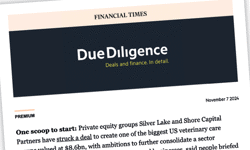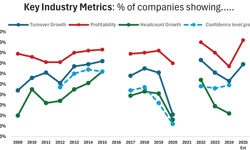If making money from digital publishing is proving to be tough, pivot.
Pivoting is an agile approach to developing businesses, which can be very effective in times of change. The practice of pivoting is commonly used by tech startups, but there’s a tremendous amount that traditional publishers can learn from the approach and philosophy. It requires a level of honesty and humility - to accept that things are changing faster than we can perhaps predict - and willingness to work in an agile way.
This is the story of how we created a successful digital brand – London24.com - in 2012, developed it by adapting the proposition in 2013, and have just pivoted again in 2014 to keep it on an upwards trajectory.
London24.com – from concept to early success
Just over two years ago, we took action to explore the answer to a question that we had toyed with for a while. Could we take the content from the fourteen newspapers we publish in London, curate that content, add to it, and create a new brand that would appeal to a wide base of Londoners? We didn’t know the answer, because it hadn’t been attempted before, but there were enough positive indicators for us to give it a go. London24.com was born.
Bootstrapping our way forward since then, we’ve turned London24.com from an idea, into Archant’s biggest digital brand (1m monthly unique visitors); one that the Mayor of London’s office uses to promote London to Londoners, and large scale advertisers like Vodafone, Intel and Renault have chosen as a primary vehicle to reach an audience of London residents at scale.
The journey to our successes so far hasn’t been linear or conventional, which makes it all the more interesting.
Defining our vision
Our goal was for London24 to become the number one London-centric news and information portal - a gateway to the capital city, from a local perspective. We would start small, but our aim was to develop the proposition into a destination where anyone with an interest in London can rapidly access information, inspiration and build community and commerce connections on subjects that matter most to them.
Focus group research validated the concept; indeed the feedback indicated a strong appetite among London residents for a local news portal for the capital.
So we set about it - curating relevant stories from Archant’s fourteen local London newspapers (which include the Ham & High, Hackney Gazette and Islington Gazette). A small, dedicated editorial team was created to add a layer of unique content, and we started to build a decent-sized social media following for our fledgling brand.
London24’s audience grew rapidly in the first year – in part because of interest in the mayoral election in 2012 and a raft of interesting local stories from East London leading up to the Olympic Games. The audience continued to grow - albeit more slowly - through the first half of 2013 (reaching an audience of more than 750,000 Londoners in July 2013).
However – audience growth plateaued after that, and more worryingly, user engagement metrics (such as ‘average time spent on site’ and ‘return frequency’) began to fall.
That’s when we got busy with an investigation to find out what had changed so we could respond appropriately.
What changed? Why?
We needed to find out, and fast. To ensure we got accurate insights, we appointed specialist agency – Spotless Interactive - to conduct extensive focus group research.
We wanted to unearth views from the target audience groups (London residents of various age / demographic profiles) about what they thought of the current proposition, and if (and how) it might form a part of their media consumption. We also wanted to get feedback about what wasn’t in London24 that would be useful, helpful or relevant to their lives as Londoners.
The findings were very revealing – not just about London24, but also about how the ways in which many Londoners consume content had changed radically in the eighteen months since we conducted the first focus group research.
Broadly, the key findings were:
* Local news is still useful and relevant, but readers wanted more utility content built in as well, to make the proposition more useful and helpful.
* Users want to access content on the move – content snacking perfectly ‘good enough’ in the immediate term. Low tolerance of sites that weren’t mobile optimised (London24 wasn’t at the time).
* Readers wanted news and information to be contextually relevant to their real-time location.
* Readers wanted to discover local things to do, local traders, and deals and offers that were local to them.
Eating the elephant a bite at a time
The research findings were clear. Even though London24 was only a fledgling business, we needed to change quite radically. There was a lot to be done. Being practical about it, we accepted that it mightn’t be possible to adjust our proposition as quickly as we might like. But we also knew that to try to ignore the feedback from our readers and carry on as we were is also risky, because the cost of not changing can be catastrophic. We need to know the effect of shifts in our readers’ behaviour at the earliest opportunity. In the online environment, shifts are getting more frequent and larger and if we don’t constantly look out for them, there’s a danger of getting overwhelmed by a tsunami of change.
To avoid falling into that trap with London24, we started with the changes we could make quickly and at relatively low cost. Our approach is to focus our internal resource around their core competencies and we outsource or partner for everything else. In other words, we do what we do best, and partner for the rest.
For example, it was clear from the user testing that we had to make our content easy and convenient to consume – especially for people on the move. That meant upgrading to responsive web templates, so that the experience is automatically tailored / optimised for the size of screen it is being read on. We ran that exercise as a project, bringing in specialist skillsets as required, from UX / UI experts, to designers, developers and a project manager.
In conjunction with that project, and while it was underway, we set about building partnerships to deliver elements of data-based content and utility content that our target audience had said would make London24.com more helpful, useful and relevant.
We struck partnerships with PlanVine to integrate a comprehensive events listing section, with StreetLife.com to facilitate community conversations and with HonestJohn.co.uk to incorporate a City Motoring section into London24.com.
Connecting communities, and listening to the conversations
Streetlife.com is a social network that allows people to find out about the area that they live or work in from their neighbours.
It’s a great resource for residents to find local information and recommendations, to start conversations, to find out what’s happening in their area and to start campaigns.
It’s a product that fits in perfectly with London24’s goal of being helpful, useful and relevant to local life in London. It allows our readers to connect to others in their local area, and also to let us know about interesting things that are going on.
So in 2013, we forged a partnership with StreetLife, as part of our response to the focus group research. Our analytics show that our readers are clearly embracing it - StreetLife’s audience is growing almost exponentially in areas where Archant has partnered with them, and it works particularly well in London.
Monetising London24.com
We’ve got a three-strand approach to monetising London24.
Display advertising is still our primary revenue generator; here we target advertisers who are specifically seeking a London-centric audience, and sell large-format ad units that deliver decent response. Our approach is to go for the premium sell, and it’s working.
The new London24 templates have a maximum of four ad slots, and ad responses are often 10x what you might expect from a more bog standard news website. We have a small, dedicated local sales force, and the team at Iconic Media handles national digital sales for us.
Secondly, we’ve recently introduced a couple of native advertising formats, and we’re continuing to test and learn in this area. Our new ‘London24 promotions’ area allows advertisers who have products and services that are relevant to a London audience to promote them in an advertorial-esque way via a ‘whole audience’ proposition.
The remainder of our revenue comes from a variety of products – print / online bundled packages, newsletters, sponsorship, affiliate partnerships etc.
Future development plans
Currently, there are three key areas of development that we’re working on, although of course, that’s as of now. Ask me again in six months, and we’ll almost certainly be working to develop other areas too.
1. Data
For now, we’re working hard to better understand our audiences, their preferences, their likes and dislikes, so that we can improve our relevance and appeal.
2. Content development in conjunction with London bloggers
We’re continuing to build our network of local London bloggers. We already work with quite a few London writers; it’s an arrangement that works well for both parties. In time, we plan to help these bloggers to monetise their audience by offering them an opportunity to become part of our London24 advertising network.
3. Partnerships
We’re currently engaged with a number of partnerships to help us deliver elements of the future London24 proposition that we simply don’t have the resource or skillset to do alone.
User testing
We put a lot of emphasis on user testing, which allows us to keep our product aligned with our readers’ needs.
Hopefully that means we never get too far down the wrong path. But if we do find ourselves becoming less successful or less relevant in a particular area, we are prepared to pivot – to put in the effort to discover what's not working, and instigate corrective actions. Sometimes, they can be small changes, but often they can be big. If it looks like a big change is needed, we still start small, to get a proof of concept before committing large resources.
Results
Audience: London24.com has doubled the size of the audience that existing Archant London newspaper websites reach. From a standing start, London24.com now reaches over 1m monthly unique visitors, making it one of the UK’s largest regional newspaper websites.
Revenue: Over the past twelve months, as awareness of the London24 brand has grown, we have attracted several premium brand advertisers interested in reaching a London-centric audience at scale. Revenues are on track to grow more than 35% in 2014 compared to 2013.
Engagement: One of our aims for London24.com is for it to be truly social; we want the news and information we curate to be easily sharable, and easy for Londoners to contribute to. Up to 25% of traffic to the site now comes by way of social media referrals, and London24 has more than 89,000 followers on Google+, which is among the highest of any local news media brand in the UK.
Summary
1. Start small, make it cheap
Start small. Test the idea with a sample of your audience. Starting small allows you to kill ideas without regrets if they don’t resonate. The approach of only backing BHAGs (Big, Hairy, Audacious Goals) and going in all guns blazing can be exciting, but if it doesn’t work, you’ll have a demoralised team and a frustrated finance director to deal with!
2. Measure, measure, measure
If you don't know what to look for to assess how well your idea is doing, that’s a problem. You won’t know what success or failure looks like; and that won’t do. Work out what metrics are important along the way and watch them like a hawk so that you have a sense of the direction your idea is heading.
3. Learn to pivot












